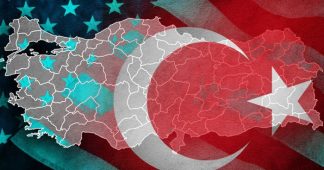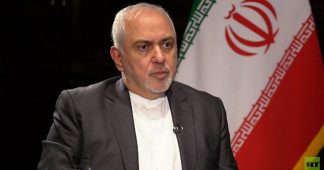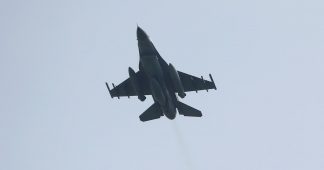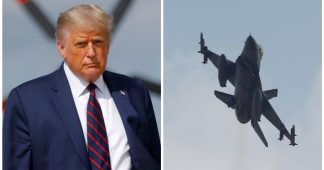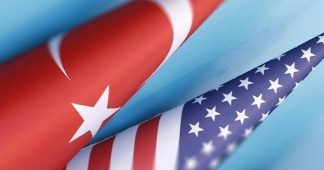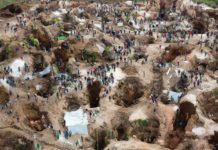By
The past week has witnessed reports of increased Turkish military activity in Iraq and Syria as well as its intruding itself deeper into the war in Yemen. In all three cases Ankara has pitted itself against forces that are or can be seen to be pro-Iranian: Shiite parties in northern Iraq, the government of Syria and the Houthi-led government in Yemen.
Direct tensions between Turkey and Iran have been increasing since last year over the above three nations as well as the Turkish-directed attack on Nagorno-Karabakh by Azerbaijan (Turkey and Azerbaijan identify themselves as “one nation, two states’) and its aftermath.
Each time the North Atlantic Treaty Organization has rushed to Turkey’s defense over the past eighteen years – holding Article Four consultations four times (one time to “protect” it against Iraq, three times against Syria), maintaining three Patriot anti-ballistic missile batteries since 2013 – it has referred to the nation as NATO’s southeastern border. In addition to Turkey having the largest population and the largest military of any NATO member state except for the U.S., it is also the only member of the military bloc to border countries in the Middle East and the Caucasus: Iraq, Iran, Syria, Armenia, Azerbaijan and Georgia. Turkey has invaded the first and third and participated in a near-invasion against the fourth. (Last September a Turkish F-16 shot down an Armenian SU-25, killing its pilot.)
The U.S. maintains B61 nuclear bombs in Turkey under a NATO nuclear sharing/burden sharing arrangement which mandates that the host country provide aircraft to deliver the bombs. NATO also has its Joint Command Southeast and Allied Air Component Command headquarters in Turkey. It moved its Allied Land Command to Turkey in 2012. In the same year it installed a Forward-Based X-Band Transportable anti-missile radar facility with a range of 2,900 miles. This year it handed over the command of its Very High Readiness Joint Task Force to Turkey.
Nothing Turkey does in the Middle East, the Caucasus, North Africa and the Eastern Mediterranean can be seen aside from its status as a NATO member. Nothing it has done and is doing in those locations has ever been criticized by NATO.
On April 23 Turkey’s military launched Operations Claw-Lightning and Claw-Thunderbolt in northern Iraq, claiming to have destroyed over 500 targets in attacks that included strikes from warplanes, drones and artillery and airdropping paratroopers and commandos from Chinook and Black Hawk helicopters.
On May 1 Turkey’s Interior Minister Suleyman Soylu announced that Turkey will construct a military base in Iraq, ostensibly to combat the Kurdistan Workers’ Party (PKK), stating, “Just like we did in Syria, we will establish bases and control the area.”
The leader of the al-Nahj al-Watani party in the Iraqi parliament, Ammar Ta’meh, denounced Turkey’s “expansionist plans,” stating they would further vitiate already strained relations between the two countries and “bring harm and loss to everyone.”
In addition to the PKK, Turkish military forces in northern Iraq have increasingly come into conflict with pro-Iranian Shiite groups, leading to direct engagements as well as to worsening the antagonism between Ankara and Tehran.
In February the Iranian Foreign Ministry summoned the Turkish ambassador to Iran, Derya Örs, to express grave concerns over the Turkish interior minister accusing Iran of harboring PKK fighters. Iran condemned the remark as being “unacceptable” and a violation of protocols befitting cooperation and good relations between nations.
The Foreign Ministry also communicated objections to comments by Turkey’s ambassador to Iraq (see below), with the government news agency adding, “the territorial integrity and national sovereignty of countries were stressed as the fortifying base of international relations.”
Later the same month Turkey summoned the Iranian ambassador to condemn remarks by Tehran’s ambassador to Iraq, Iraj Masjedi, accusing Turkey of violating Iraq’s sovereignty and territorial integrity – which is the simple truth – with ongoing cross-border military operations. His words were: “We reject military intervention in Iraq and Turkish forces should not pose a threat to violate Iraqi soil.”
Turkey’s ambassador to Iraq, Fatih Yildiz, responded in a tweet with: “Ambassador of Iran would be the last person to lecture Turkey about respecting borders of Iraq.”
The Turkish accusations against Iran center in part on claims that Iranian units of the Popular Mobilization Forces (PNF) were in some – truly convoluted – manner affiliated with PKK fighters in northern Iraq. And on the contention of Turkish Foreign Minister Soylu, as seen above, that Iran was harboring “525 terrorists.” He didn’t indicate how he had determined the exact figure.
Almost two months before the current Turkish offensive in Iraq, Iraqi news reports stated that Popular Mobilization Forces militias were deploying three brigades in the Sinjar district of the Nineveh Governorate in northern Iraq to confront Turkish incursions. It was also reported that “the PMF has deployed 15,000 fighters and built new bases in Sinjar to counter any Turkish military threat.”
Another proxy conflict between Turkey and Iran is in Yemen. Recently Abdul Wahab Al-Mahbashi, member of the Supreme Political Council in Yemen, the executive body of the Houthi-led government based in Sanaa, warned Turkey against further military involvement in his nation. He predicted that Turkey, like its new ally Saudi Arabia, would be defeated in any attempt to do so, stating, “If Turkish soldiers enter Yemen they will have a fate worse than that of the aggressors who preceded them.”
Recent reports claim that Turkey has unloaded twenty armored vehicles and equipment at Somali ports to be shipped to the Yemeni port of Qena for Saudi-backed Islah militias.
From the beginning of the horrific catastrophe inflicted on the Yemeni people by Saudi Arabia, the U.S. and its allies, the perception has existed that at root the crisis there was in part a Saudi-Iranian proxy war. Turkey has now entered that conflict on behalf of Saudi Arabia and against Iran.
In a recent report by the Middle East Monitor based on regional press accounts it was suggested that Turkey will replicate in Yemen what has proven effective for it in Libya and Nagorno-Karabakh. A two-pronged strategy of drone warfare and importing Islamist mercenaries. The Shaam Times reported that 300 Syrian fighters have joined the ranks of the Islah militia in Marib, the last stronghold of Saudi-backed forces in the north of Yemen.
Turkish drones were used extensively in Libya and against Nagorno-Karabakh and Armenia, and Turkey has now provided Bayraktar TB2 drones to Ukraine for the war in the Donbass. The Middle East Monitor feature indicates that Turkish drones have already been used in Yemen.
Abdul Wahab Al-Mahbashi, the above-cited Yemeni official, warned that Turkey could deploy troops to his country, in which case “Invading Yemen will not have a happy ending for Erdogan himself as well as the country’s government and military,” or could repeat what it did in Libya and Nagorno-Karabakh by deploying mercenaries.
During last year’s war by Azerbaijan and Turkey against Nagorno-Karabakh, Armenian, Syrian and Russian officials and other sources warned of Turkey deploying thousands of Syrian and other mercenaries, as many as 4,000, to Nagorno-Karabakh.
Since the collapse of the Soviet Union and the emergence of Armenia as an independent nation in 1991, Iran has had no closer or more reliable ally in the world. The Azerbaijani-Turkish war against Nagorno-Karabakh and Armenia last year was then also a message to Iran. In two ways. First, its closest ally was attacked and humiliated. Second, a war to “liberate” ethnic Azeris was a warning to Iran itself, where as many as 18 million ethnic Azeris reside.
Turkish President Recep Tayyip Erdoğan was the guest of honor at the postwar victory parade in the capital of Azerbaijan on December 10, where among other matters he praised Enver Pasha, one of the key architects of the Armenian genocide of the last century, and read a poem condemning the “division of Azerbaijani territory” between Iran and Russia in the 1800s.
As a result of Erdoğan’s incitement in Baku, the Iranian Foreign Ministry summoned Turkey’s ambassador to Tehran. “The Turkish ambassador was informed that the era of territorial claims and expansionist empires is over,” Iran’s Foreign Ministry said on its website.
“Iran does not allow anyone to meddle in its territorial integrity.”
In addition to Turkey’s proxy wars with Iran in Iraq, Yemen and the Caucasus, there is also that in Syria. As the Turkish interior minister acknowledged above, Turkey has troops and bases in the north of the country. Its military incursions have displaced tens if not hundreds of thousands of Syrian civilians. In the past week Syrian news sources have reported that:
The governor of Raqqa, Abdul Razzaq Khalifa, accused Turkey of reducing the water supply from the Euphrates River to Syria from 500 to 200 cubic meters per second, contrary to a 1987 agreement not to reduce the rate to under the first level, “which prevented the operation of the turbines from generating electricity produced in the Euphrates Dam, in addition to reducing irrigation and drinking water.”
Syrian Arab News Agency places the event in the context of continued military attacks by Turkey and mercenaries under Turkish control.
An explosive device was triggered in the city of Ras al-Ayn “where Turkish occupation forces and their terrorist mercenaries” operate.
Two pro-Turkish fighters were killed in internecine fighting in the city of Jarablus.
By expanding military attacks against Iran’s few allies in the world – in Iraq, in Yemen, in Armenia, in Syria – Turkey is spearheading the West’s campaign to isolate, contain and confront Iran.
Published at antibellum679354512.wordpress.com
